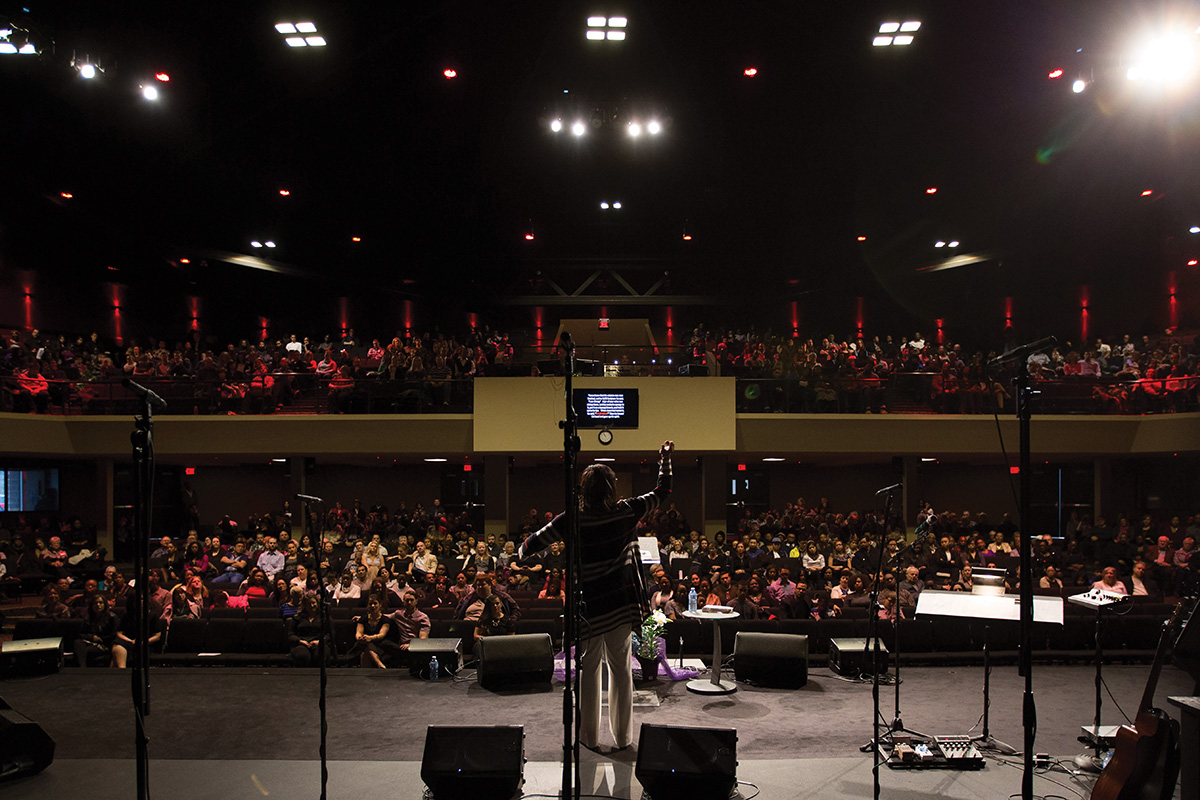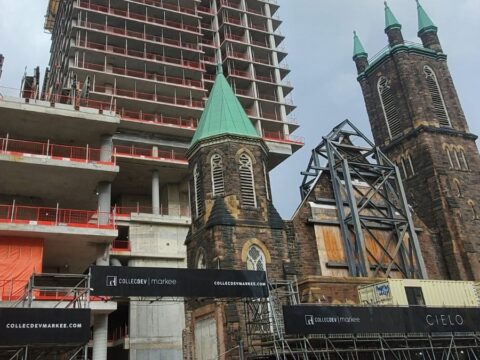The first clue that I am in a very different church context is the parking lot attendants. Who are they kidding? I think to myself. It’s the Civic Holiday weekend; there is no way this lot is going to be full.
This Sunday, I am worshipping at Whitby Christian Assembly, a Pentecostal church located east of Toronto and just north of where I live. I have driven by this church hundreds of times and chose it at random to experience the evangelical church first-hand.
You may unsubscribe from any of our newsletters at any time.
As the parking lot fills up, I realize I’m wrong, seriously wrong. Waves of people stream in, close to 700 in total. To give some perspective, there is not one United church in the whole country that gets that number on any regular Sunday morning. And in many United churches, the Sunday of the August long weekend is the worst attended of the year.
I enter the air-conditioned worship space with its comfortable seats, multiple screens and lighting that would be the envy of many theatre companies. Eighteen people are at the front leading worship; the music is impressive and the energy infectious. The hour and 45-minute service is long by United Church standards, but no one seems bored. The sermon, on the book of Job, is well presented and biblically thoughtful. The congregation represents all ages and multiple ethnicities. When I ask the West African-Canadian family beside me what they like about their church, they say, “the diversity.”
About 70 different ethnic groups make up this congregation, and Lead Pastor Roger Malcolm says they continue to attract new immigrants, particularly from the West Indies and Nigeria. When I ask what draws people to this church, Malcolm is emphatic: “We have a high view of scripture: the Bible is the word of God — the entirety of the Bible.” On average, evangelicals read the Bible on 121 days per year, whereas mainline Protestants read it only on 19 days, according to the 2013 Canadian Bible Engagement Study. “I believe in the historical creeds of the church, and that Jesus was the divine son of God, that Jesus died for my sin and brokenness,” Malcolm says, adding, “That’s what gives people hope.”
For many mainline Canadian Christians, the evangelical church is unknown territory. We share a common faith, but little else. Throughout my almost 30-year ministry, I have spent more time in interfaith dialogue than I have with evangelicals, with whom I share the Christian story. I’ve heard both clergy and lay people utter less-than-generous comments about evangelicals. Enviable growth in the evangelical church — something dwindling mainline churches would do well to study — is too often dismissed with simplistic explanations: they offer upbeat music and appeal to those who want easy answers in complex times. But how many mainline Christians — clergy or lay — have actually set foot inside an evangelical church?
I decided to set prejudice aside and discover for myself how evangelical churches in Canada are faring. Are they all overflowing? Is it just the music? What are their struggles, their issues and their joys? And what can we learn from each other?
“Holding our own” is the answer that Rick Hiemstra, director of research and media relations for the Evangelical Fellowship of Canada gives in response to my question on how evangelical churches are doing in Canada today. Hiemstra points out that the evangelical church is hugely diverse, with over 43 denominations represented by his organization. The church is thriving in some areas and struggling in others, such as in rural Canada, he says.
After our talk, Hiemstra sends me a PowerPoint presentation that highlights some of the differences between evangelical and mainline Christians, using information from sources such as Angus Reid and the 2011 National Household Survey. For example, 40 percent of evangelicals attend worship weekly, compared to 10 percent from mainline churches. They are younger too: 27 percent are age 25 to 44, whereas in the mainline church the number is 18 percent. Only 12 percent of their members are 65-plus; seniors make up a quarter of the mainline church.
Perhaps more significantly, “the real growth we are experiencing lies in the new immigrant churches of African, Latin American and Asian heritage.” Twenty-four percent of evangelical affiliates are immigrants, and only a quarter of these arrived before 1981. (By contrast, 11 percent of mainline affiliates are immigrants, and two-thirds of these arrived before 1981.) A prime example is a congregation like Richmond Hill (Ont.) Christian Community Church, which has a Sunday turnout of 4,400 people attending multiple services in three languages. According to one survey, Canadian Christians who were born in the Global South attend church 1.5 to three times as often as those born in Canada. The lesson is crystal clear: if the United Church wants to revitalize itself, it has to be far more effective at reaching new Canadians.
Hiemstra also points out that evangelicals “are innovators almost to a fault.” This comes out of a deep sense of mission to make disciples and to “introduce people to Christ.” One evangelical church in London, Ont., even has a skateboard park. “We use points of cultural connection all the time to reach people,” he says. This is why evangelicals meet in movie theatres and use social media extensively.
Hiemstra is reflective about the state of evangelicalism in Canada. He says 2007 was a seminal year in our wider North American culture: “That’s when the first iPhone was introduced and personal autonomy became the greatest good.” He believes that the major flashpoint between the church and the wider culture is around the question of ultimate authority: does it reside within ourselves, with the wider community, or with God?
“We live in a culture where the rule is the absolute authority of the self. There is no sense that we are accountable to God and each other, as we saw in the physician-assisted suicide debate. There needs to be good theological reflection on this, or we will be seen to be irrelevant.” Hiemstra feels that we need to emphasize the church as the body of Christ and present a strong counterpoint to our culture. “The churches that are growing have a clear belief system. It can be a shock to Canadians to find people who actually have beliefs.” Ultimately, he says, the church needs to offer a “genuine encounter with the Holy God.”
Tyndale University College & Seminary sprawls across 56 acres in the northern part of Toronto. The seminary currently has close to 800 students representing 50 different denominations and 30 different ethnic groups. It even offers a master of divinity in Mandarin. “I’m a minority when I teach,” says President Gary Nelson, who is Caucasian. “Immigration has brought new life to the evangelical church. . . . Our congregations that have stayed Anglo-Saxon [in multicultural neighbourhoods] are struggling.”
Asked why evangelicals have been so successful in attracting new Canadians, he echoes what I have heard in other conversations: “We have a high view of scripture, and we believe in an encounter with Christ that is life-changing. This connects with evangelicals who come from other countries.”
Recognizing that all churches have challenges in our current culture, Nelson says, “More and more Canadians have less and less Christian memory. We [all Christians] thought we were Jerusalem [a minority culture], but actually we were Babylon [a majority culture]. And now we are being pushed to the margins, and we don’t know how to be the stranger in our own land.”
What can we, in the United Church, learn from Canadian evangelicals? For Nelson, the answer is clear: “How to do church in a post-Christian world. There are currently 15 new evangelical church plants in Toronto alone.” He regrets that there is little dialogue between evangelicals and the United Church right now and is hopeful that more conversation can happen.
Among the 1,162,900 newcomers who arrived in Canada between 2006 and 2011, 47.5 percent identified as Christian. Robert Cousins, who heads up the Tyndale Intercultural Ministries Centre, says the church has to move beyond seeing immigrants’ new church expressions as “rental income opportunities,” and begin seeing them as “partnership opportunities — for the health of the church.”
Lorna Dueck is the newly appointed CEO of Crossroads Christian Communications Inc., which oversees Yes TV, a Canadian evangelical Christian broadcaster. Dueck sees her role as leading “media creation that brings the Gospel to all stages and all ages of the human journey.” In an email interview, she describes the evangelical church as “the cowboy in the family of God; ready to charge into any situation, eager to go after one lost or a wild herd.” Dueck says that evangelicals “take the Great Commission, ‘Go into the all the world and make disciples,’ very seriously.” A 2013 Angus Reid survey showed that 73 percent of evangelicals moderately or strongly agree with the phrase: “I feel it is very important to encourage non-Christians to become Christians.” Only 15 percent of mainline Christians concurred. In Dueck’s work as a broadcaster and writer, she says she has tried to reflect the best of the Christian tradition, to show people the love of Christ.

If Canada is a post-Christian society, there is still at least one major city that has echoes of Christendom: Calgary. With congregations like Centre Street (6,200 people per weekend at multiple locations), First Alliance (3,800) and Experience Church (1,000 people, mostly millennials), Christianity still has an important place southern Alberta.
Arch Wong is a professor of practical theology at Calgary’s Ambrose University, a private Christian university and seminary founded by the Church of the Nazarene Canada and the Christian and Missionary Alliance in Canada. He is also associate director of the Ambrose-affiliated Flourishing Congregations Institute, an organization that’s committed to studying and understanding the common elements of thriving congregations, which includes: active spiritual life within congregations; belonging; inspiring mission; quantitative growth (attendance, membership and finances); leadership that empowers others; outreach and service; and community presence.
Wong believes that the success of the evangelical church can be traced to how seriously it takes leadership development. “Our churches are learning organizations with an entrepreneurial nature. We are eager and willing to learn from others and take the best from the corporate world and human sciences,” he says in an online video interview. He also says evangelical churches possess institutional flexibility, which allows them to create various services with different worship styles and to meet the needs of multi-ethnic congregations.
He thinks United Church people would be surprised at the degree to which evangelical churches engage with social causes. Inn from the Cold and the Mustard Seed are two local outreach organizations that have partnered with different evangelical churches in Calgary. Wong also thinks mainline churchgoers haven’t grasped the growing evangelical commitment to social justice. “Right now at Ambrose, we are spending a lot of time looking at the Truth and Reconciliation Commission report and what it means for our school and churches.”
But Wong also has concerns for the future. “Currently evangelicals are about 10 percent of the Canadian population, but we are having fewer children and immigration trends might not work for us as they now are. The reality is that there are going to be fewer of us — unless we take even more risks.”
On another Sunday morning in mid-August, I attend Forest Brook Community Church, a Brethren congregation in Ajax, Ont. The churchgoers are celebrating the end of their weeklong day camp that had 180 campers, 40 youth volunteers, 60 adult volunteers and all seven pastoral staff. Close to 400 people fill the sanctuary that Sunday, and the children and youth are central to the whole service. Announcements include a celebration of a 50th wedding anniversary, and an invitation to a barbecue followed by a giant water fight that Wednesday night. The family-friendly atmosphere is very engaging; it feels like a happy church.
Seven years ago, the picture was somewhat less rosy. A neighbouring church had hired a pastor in his early 30s who introduced louder music, smoke machines and experiential worship to attract young adults. Many surrounding churches felt its impact. Forest Brook itself lost a large portion of its young adults, and it took a member of that cohort to draw their attention to what was happening so they could deal with it.
Kevin Armstrong, Forest Brook’s executive pastor, says migration between evangelical churches can happen for other reasons, too. Sometimes there are underlying theological motivations at play.
While essentially all evangelicals believe that Christ is returning at some point in the future, there are those for whom this return is imminent. For them, we are in the “end times” as described in the book of Revelation. Thus, there is a real urgency to save as many people as possible before the clock runs out. That means that if a new church is doing a better job of attracting the unchurched, it also becomes more attractive to existing evangelicals who like to see growth and the Great Commission being fulfilled.
One “incredibly threatening issue” for the evangelical church, according to Armstrong, is LGBTQ equality. In many of my conversations, this topic caused the most discomfort. A 2015 Angus Reid study showed that 46 percent of Canadian evangelicals “disapprove of and do not accept” same-sex marriage (compared to 16 percent of all Canadians). A smaller group — 29 percent — “disapprove of but accept” same-sex marriage, and the remaining quarter “approve of and accept.”
Four years ago, the lesbian daughter of a longtime member of Forest Brook came to church with her partner and their baby on a Sunday when there was an infant dedication service. Armstrong asked himself, “What do we do if she asks to have her child dedicated?”
And so began a conversation in that congregation that is ongoing. “Thirty-five years ago, women in the Brethren church could not lead in worship and were told to keep their heads covered. Now they are leading congregations. We changed on this issue, and we can change on others as well,” Armstrong says.
“It’s about how we view scripture and its authority,” Armstrong notes. “We have to get beyond the words on a page. There is a context, and we need to be open to hearing the Spirit.”
While his congregation has not fully resolved this issue, it has moved beyond the “love the sinner hate the sin” response that others have adopted. For Armstrong, sexual orientation is not a sin, but his congregation is still wrestling with what that means in practice. “The United Church has been dealing with this and First Nations issues for 30 years. There are things you can help us with, just as there are things that we can help you with.”
Rev. Rob Dalgleish is the executive director of Edge, the renewal movement for The United Church of Canada. I asked him what he thinks United Church people could learn from evangelicals. In short, he says, a lot.
“The first thing we need to do is to get over our sense of intellectual superiority. We need to collaborate so we can be stronger together. We need to learn from their conviction that what they do matters, and how to reshape the church to fit a new social and cultural context. Let’s embrace their experimental nature.”
I agree with Dalgleish. United Church people are fond of saying that numbers don’t matter. But we are in the midst of an $11 million reduction from our General Council budget between now and 2018, and we are closing more than one church per week. We don’t have the luxury of ignoring numbers.
Significant theological contrasts exist between mainline and evangelical Protestants. We view scripture differently, and that informs our theology and world view. But there is also much that we share in common.
As I finish up my coffee with Kevin Armstrong of Forest Brook, he offers a final thought: “For me, there is only one question that matters: Who can we love, and how can we love them? I just want to be part of a church that is loving people.”
So do I.
This story first appeared in the November 2016 issue of The Observer with the title “That evangelical sizzle.”













